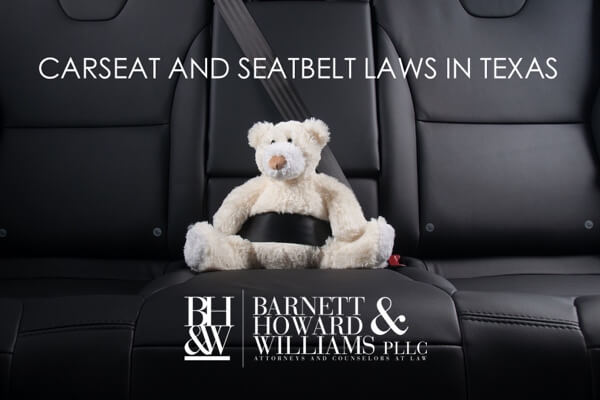
Texas Car Seat & Seat Belt Laws: Rules vs. GuidelinesCar Seat and Seat Belt Laws in Texas: Sorting Out the Laws From the Guidelines
Baby On Board: What Does Texas Law Say About Keeping Our Kids Safe in the Car?
 We’ve all seen those yellow “Baby on Board” signs proudly displayed by new parents on the back windows of cars. In a perfect world, drivers would slow down and car accidents involving children would never be an issue. But we don’t live in a perfect world. The Insurance Institute for Highway Safety (“IIHS”) reports that car accidents cause one in four unintentional injury deaths in children younger than 13. The IIHS explains that while most crash deaths occur among children traveling as passengers, proper restraint use dramatically reduces these fatalities.
We’ve all seen those yellow “Baby on Board” signs proudly displayed by new parents on the back windows of cars. In a perfect world, drivers would slow down and car accidents involving children would never be an issue. But we don’t live in a perfect world. The Insurance Institute for Highway Safety (“IIHS”) reports that car accidents cause one in four unintentional injury deaths in children younger than 13. The IIHS explains that while most crash deaths occur among children traveling as passengers, proper restraint use dramatically reduces these fatalities.
Such statistics are a sobering reminder that we must do all we can do to ensure that our kids are safe while traveling in a car. So what can Texas families do to make our daily commutes safer for our children? What does Texas law say about keeping our kids safe in the car?
Car Seat Laws in Texas
The car seat law in Texas, meaning the rules for which you can be issued a Class C citation, are provided in the Transportation Code. Section 545.412(a) of the Texas Transportation Code states:
“A person commits an offense if the person operates a passenger vehicle, transports a child who is younger than eight years of age, unless the child is taller than four feet, nine inches, and does not keep the child secured during the operation of the vehicle in a child passenger safety seat system according to the instructions of the manufacturer of the safety seat system.”
SUMMARY OF TEXAS CAR SEAT LAW:
- 8 years – Children must remain in some sort of car seat or booster seat system until they are 8 years old;
- 4’9″ Tall – If a child younger than 8 is taller than 4’9″, he or she may ride in a normal seat without a booster; and
- Follow manufacturer instructions – It is a violation to use a safety seat improperly.
One of the important parts of the Texas car seat law is that seat must be properly installed according to the manufacturer’s instructions. USA Today reports that nearly half of all car seats are installed improperly. Many law enforcement agencies are trained to understand proper car seat installation. While it is unlikely that an officer will issue you a citation if you have a car seat that happens to be improperly installed, you should still make sure to get your car seat checked out for the safety of your child.
DEFENSE: It is a defense to prosecution that the individual is operating their vehicle during an emergency or for a law enforcement purpose.
PENALTY: Failure to comply with §545.412(a) may result in a fine ranging from $25 to $250, plus court fees.
Car Seat Guidelines in Texas
Some additional car seat tips are provided as safety guidelines or best practices, meaning that there is not a law on the books in Texas covering this. However, these are good practices that are taught by doctors and child car safety experts:
- All infants and toddlers should ride in a rear-facing car seat until they are at least two years old, or until they max out the weight or height limits per the manufacturer’s limits.
- Children two to four years old may ride in a forward-facing seat according to the manufacturer’s recommendations.
- Use a booster seat for children four to eight years old, according to the maximum height or weight limits provided by the manufacturer.
- Most seat belts will fit a child that is 4’9″ tall (normally around 10 years old). If your child is not 4’9″ tall, you should consider keeping them in a booster seat to ensure proper seatbelt fit.
Seat Belt Laws in Texas
Under Texas law, all passengers in a motor vehicle must wear a seatbelt. There are a few exceptions, like for postman, paper delivery crews, or garbage men; but for the average driver and passenger on the Texas roads, you must wear a seat belt. Section 545.413(a) of the Texas Transportation Code covers seat belt laws in Texas. The law states:
“a person commits an offense if the person, who at least 15 years of age, rides in a passenger vehicle while the vehicle is being operated and is occupying a seat that is equipped with a safety belt, and is not secured by a safety belt.”
Further, §545.413(b) states that:
“a person commits an offense if the person operates a passenger vehicle that is equipped with safety belts and allows a child, who is younger than 17 years old and not required to be in a safety seat system, to ride in the vehicle without requiring the child to be secured by a safety belt.”
Can a Teenager Ride in the Bed of a Pickup Truck? No. Under Texas law, no person under 18 years of age may ride unrestrained in the bed of a pickup truck.
PENALTY: A violation of the seat belt law in Texas can result in a fine of $25 to $200 depending on the situation.
For teenagers, who are legally permitted to ride in the front passenger seat, the Texas Department of Transportation advises that wearing a seat belt while sitting in the front seat improves survival of a car accident by 50%. To be effective seat belts must be used properly—lap belts need to fit snugly on the hips and shoulder belts should go over the shoulder and across the center of the chest. Texas law says that safety belts—designed for adult use only—are not adequate for children under 8.
Front Seat and Back Seat Passenger Laws in Texas
There is not a law in Texas regarding who may ride in the front seat. The driver must follow the car seat and seat belt laws, but there is not a law prohibiting any person or child from riding in the front seat. However, according to the safety “guidelines,” anyone under age thirteen should be restrained in the back seat due to concerns with airbag impact.
Can I Leave My Kids Alone In the Car in Texas?
Yes, but only for 5 minutes. In 2010, thirteen children in Texas were killed by vehicular heatstroke. As a result, the Texas legislature enacted laws dealing with the amount of time children can be left in a vehicle unattended. Under Texas Penal Code §22.10(a), “a person commits an offense if he intentionally or knowingly leaves a child in a motor vehicle forlonger than five minutes, knowing that the child is (1) younger than seven years of age; and (2) not attended by an individual in the vehicle who is 14 years of age or older.”
An offense under this section is a Class C misdemeanor. However, if the child is injured as a result of being left in the car, the crime can be increased to a felony, punishable by up to two years in jail and a $10,000 fine.
For More Information About Car Safety in Texas:
- American Academy of Pediatrics Car Seat Guidelines
- Safe Kids Tarrant County
- Safe Riders Texas
- Safer Car Installation Assistance
- Seat Check.Org
- Texas Click It or Ticket
Barnett Howard & Williams PLLC
based on
57 Google+ Reviews.

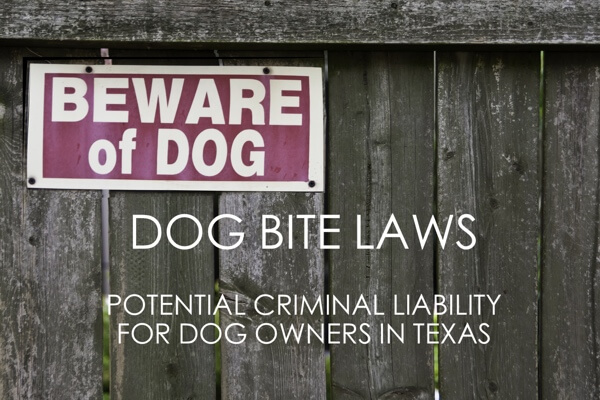
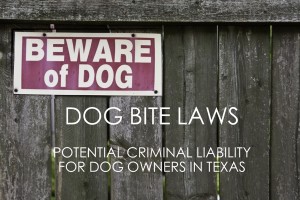 Believe it or not, a person could be criminally liable, meaning they could be convicted of a crime, if their dog attacks someone. Texas appellate courts have recently upheld
Believe it or not, a person could be criminally liable, meaning they could be convicted of a crime, if their dog attacks someone. Texas appellate courts have recently upheld 
 Gone are the days of flipping through your local newspaper’s classified section and circling your favorite ads. These days, Craigslist is the new classifieds of Fort Worth and Dallas. It is the one stop shop source to find a new car, truck, job, furniture, garage sale, or even a love interest. With the rise of Craigslist (and other online forums), there has also been an increase in criminal activity ranging from online scams to fraud and theft. Police stings based on advertisements from Craigslist are also common. Police have seen such a meteoric rise in these “Craigslist related crimes”, that many departments have established “safe exchange locations where transactions can occur under the watchful eye of local law enforcement.
Gone are the days of flipping through your local newspaper’s classified section and circling your favorite ads. These days, Craigslist is the new classifieds of Fort Worth and Dallas. It is the one stop shop source to find a new car, truck, job, furniture, garage sale, or even a love interest. With the rise of Craigslist (and other online forums), there has also been an increase in criminal activity ranging from online scams to fraud and theft. Police stings based on advertisements from Craigslist are also common. Police have seen such a meteoric rise in these “Craigslist related crimes”, that many departments have established “safe exchange locations where transactions can occur under the watchful eye of local law enforcement.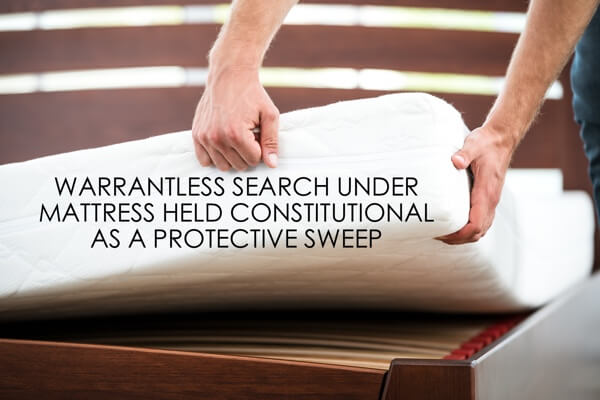
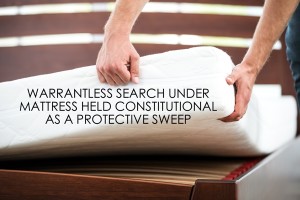 FACTS: On February 5, 2014, the Wharton County Deputy Sheriff’s Department served a felony arrest warrant on Yonari Garcia at his father’s trailer home. Yonari’s father told law enforcement that Yonari was not home, however, consented to a search of the trailer. Upon entry, Garcia-Lopez, Yonari’s brother, made a beeline for a bedroom, closing and locking the door. Law enforcement followed Garcia-Lopez and demanded that the door be unlocked. Garcia-Lopez opened the door and the police entered, continuing the search for Yonari. Garcia-Lopez asked if he could sit on his bed and eat his dinner while police searched the room. The police obliged the odd request. A minute later, law enforcement discovered two sets of bullet-proof vests in plain sight, prompting a background check. Garcia-Lopez was a convicted felon and having the body armor was a violation for being a felon in possession of body armor, U.S.C. § 922(g)(1). The police arrested Garcia-Lopez after being in the home a total of three minutes. After the arrest, police continued searching the Garcia-Lopez’s room. Concerned Yonari might be sheltered in a hollowed-out mattress, the police lifted the bed up, discovering ammunition and three handguns sandwiched between the mattress and box springs. After a total of seven minutes inside the trailer, the police left with Garcia-Lopez under arrest.
FACTS: On February 5, 2014, the Wharton County Deputy Sheriff’s Department served a felony arrest warrant on Yonari Garcia at his father’s trailer home. Yonari’s father told law enforcement that Yonari was not home, however, consented to a search of the trailer. Upon entry, Garcia-Lopez, Yonari’s brother, made a beeline for a bedroom, closing and locking the door. Law enforcement followed Garcia-Lopez and demanded that the door be unlocked. Garcia-Lopez opened the door and the police entered, continuing the search for Yonari. Garcia-Lopez asked if he could sit on his bed and eat his dinner while police searched the room. The police obliged the odd request. A minute later, law enforcement discovered two sets of bullet-proof vests in plain sight, prompting a background check. Garcia-Lopez was a convicted felon and having the body armor was a violation for being a felon in possession of body armor, U.S.C. § 922(g)(1). The police arrested Garcia-Lopez after being in the home a total of three minutes. After the arrest, police continued searching the Garcia-Lopez’s room. Concerned Yonari might be sheltered in a hollowed-out mattress, the police lifted the bed up, discovering ammunition and three handguns sandwiched between the mattress and box springs. After a total of seven minutes inside the trailer, the police left with Garcia-Lopez under arrest.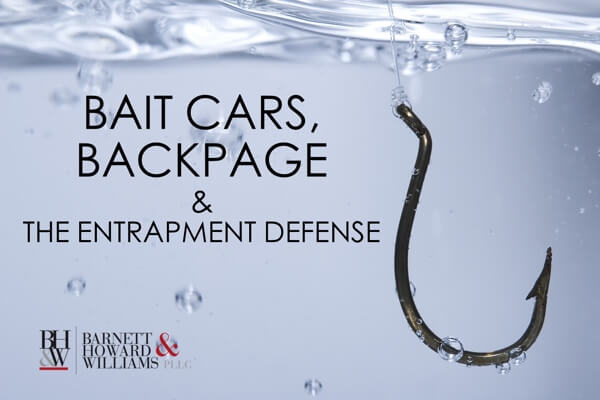
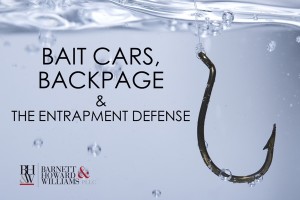 Our firm has represented many defendants in Fort Worth with cases stemming from a bait car or a Backpage ad. For those of you not familiar with either, let me explain Bait Cars and Backpage.
Our firm has represented many defendants in Fort Worth with cases stemming from a bait car or a Backpage ad. For those of you not familiar with either, let me explain Bait Cars and Backpage.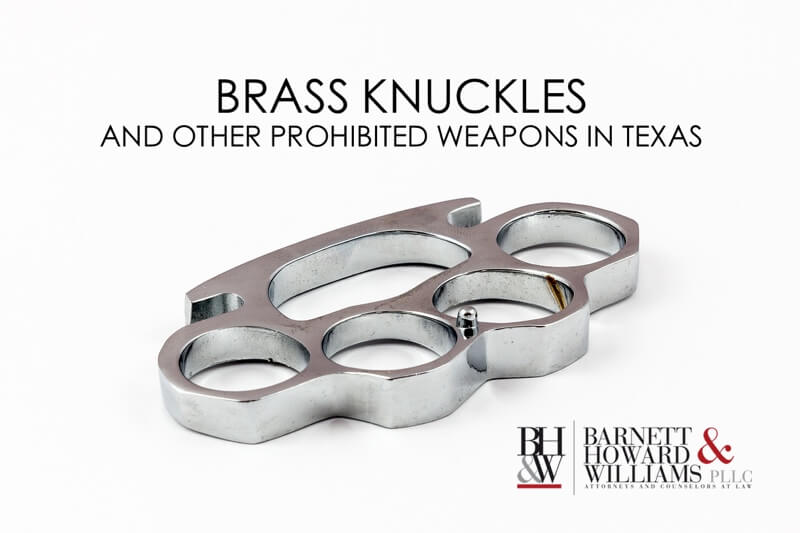
 Yes, brass knuckles are illegal to possess in Texas. Under
Yes, brass knuckles are illegal to possess in Texas. Under 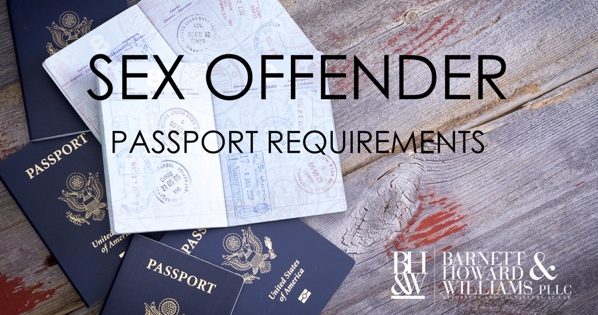
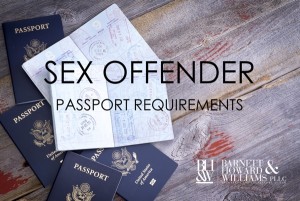 On February 8, 2016, President Obama signed
On February 8, 2016, President Obama signed 
 Texas has its fair share of military bases and military servicemembers. Sometimes those servicemembers get into trouble, be it for DWI, Domestic Violence, or other criminal offenses. The military defendant, who usually has no criminal history, is not savvy with the Texas criminal justice system and must rely solely on the criminal defense attorney he selects to represent them. Below are some of the mistakes that I’ve seen when a non-military criminal defense attorney represents a military defendant. These are my opinions and should not be attributable to the United States Marine Corps or any government agency.
Texas has its fair share of military bases and military servicemembers. Sometimes those servicemembers get into trouble, be it for DWI, Domestic Violence, or other criminal offenses. The military defendant, who usually has no criminal history, is not savvy with the Texas criminal justice system and must rely solely on the criminal defense attorney he selects to represent them. Below are some of the mistakes that I’ve seen when a non-military criminal defense attorney represents a military defendant. These are my opinions and should not be attributable to the United States Marine Corps or any government agency.
 United States v. Benns
United States v. Benns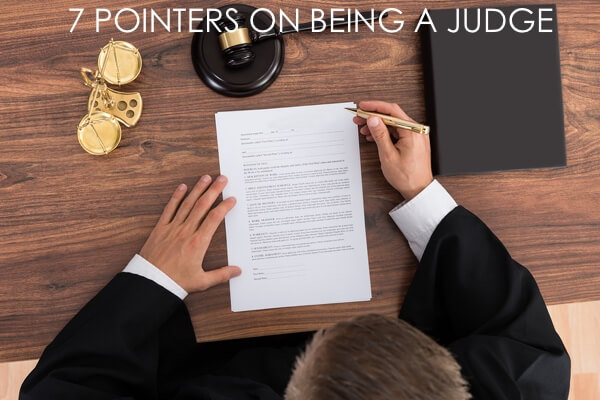
 This week I am taking a break from my Fort Worth criminal defense cases to attend a Continuing Legal Eduction at the Air Force Judge Advocate General’s School at Maxwell Air Force Base in Montgomery, Alabama. I am a reserve military judge in the Marine Corps and this is one of the annual training requirements for military judges. In one of our periods of instruction, the Chief Judge from the Court of Appeals for the Armed Forces (the highest court in the military justice system) gave us seven helpful tips on Being a Judge. I found them to be simple yet incredibly insightful. As you read these, you’ll notice that they not only apply to military judges, but state judges, prosecutors, and criminal defense lawyers as well.
This week I am taking a break from my Fort Worth criminal defense cases to attend a Continuing Legal Eduction at the Air Force Judge Advocate General’s School at Maxwell Air Force Base in Montgomery, Alabama. I am a reserve military judge in the Marine Corps and this is one of the annual training requirements for military judges. In one of our periods of instruction, the Chief Judge from the Court of Appeals for the Armed Forces (the highest court in the military justice system) gave us seven helpful tips on Being a Judge. I found them to be simple yet incredibly insightful. As you read these, you’ll notice that they not only apply to military judges, but state judges, prosecutors, and criminal defense lawyers as well.





